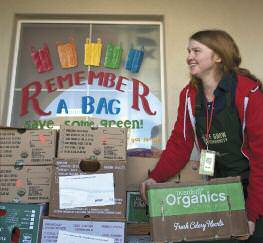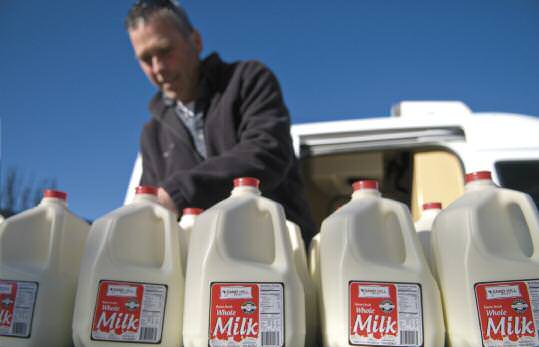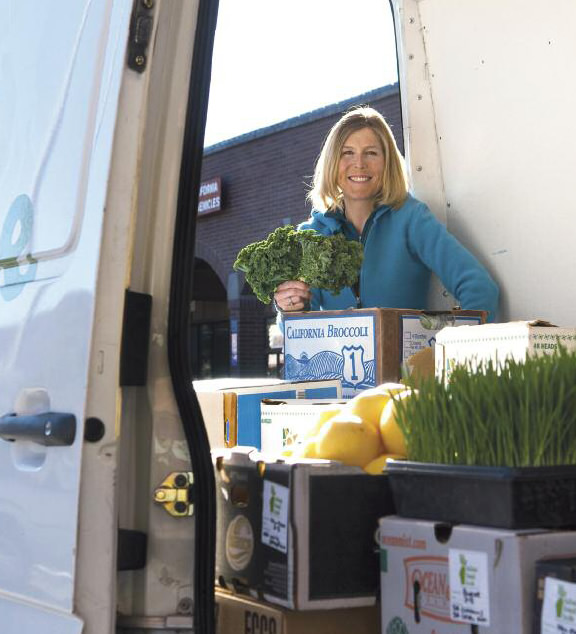edible endeavors
GROWING WITH THE MOVEMENT
Regional food hubs connect farmers and buyers.
WRITTEN BY SUE EDMONDSON
PHOTOS BY CANDICE NYANDO
FIf you’ve never heard of regional food hubs, you’re not alone. Relative newcomers to the local foods movement, they stand to be one of the most important tools to hit the market. In fact, hitting the market is what they do. Simply put, food hubs broker locally grown produce to local buyers.
But it’s not what they do that makes food hubs unique — it’s why and how.
The Why
“Food hubs promote sustainability by supporting the local food system,” says Nicole Sallaberry of the Great Basin Community Food Co-op in Reno. “They make the local economy healthier, the environment healthier, and people healthier.”
“They create opportunities for farmers and chefs to sell and buy locally grown, sustainable food,” adds Susie Sutphin, Tahoe Food Hub’s executive director. “We help farmers establish an identity with wholesale buyers, making it easier for farmers to market their product. Buyers know how produce is grown, where it comes from, and food safety practices used.”
Several regions in Nevada are considered food deserts, which the USDA defines as an area in which low-income communities have little access to fresh food and healthy whole foods.
“Food hubs help bridge the gap between poverty and healthy foods, especially in rural areas,” says Kelly Clark, USDA public affairs specialist.

The How
Think of food hubs as the center of the food distribution process for a region, say within 100 to 200 miles of the hub. They enlist sellers and buyers, then collect and distribute product, shouldering the marketing challenges that smaller growers face. Hubs may buy product outright, or charge a small fee for their services, or both.
Hubs in Action
Great Basin Community Food Co-op managers established the area’s first regional food hub. It started with a modest (but time consuming) email program to facilitate sales of local produce. In February 2012, Great Basin launched the web-based DROPP (Distributors of Regional & Organic Produce and Products), a sophisticated but user-friendly system.
Products are listed on the DROPP webpage, purchased, then delivered to Great Basin for pick-up or delivery. In 2013, the co-op’s community partners, including restaurants, nonprofits, schools, caterers, and others, purchased nearly $100,000 worth of local products through DROPP.
Tahoe Food Hub followed in 2013, selling produce grown within 100 miles to North Lake Tahoe restaurants, small grocers, and the Tahoe Truckee Unified School District. Although pleased with the progress, Sutphin’s sights are set higher.
“I’d like to see a whole network of regional food hubs,” she says.
The Healthy Communities Coalition of Lyon and Storey counties serves as the hub for its thriving food economies.
“What’s often missing in the rural areas is the organizational piece,” says Christy McGill, executive director. “That’s our part.”

Community Collaboration
Great Basin’s work with the Food Bank of Northern Nevada is making it possible for farmers to use refrigerated food bank trucks that are returning from rural deliveries to transport their produce.
“It will cost farmers about three cents a pound,” Sallaberry says. “Think how much that will save them in time and money. Produce will get here faster, and be more affordable. And it stays refrigerated!”
Tahoe Food Hub created a Farm to School fund to help schools buy local food for school meals, and is enlisting local businesses to support the initiative.
Merchants have already demonstrated their appreciation of Tahoe Food Hub’s role in the community. It’s this year’s beneficiary of the Downtown Truckee Truckee Wine, Walk & Shop, set for Oct. 4.
In Lyon and Storey counties, farmers help students with school gardens. In turn, students staff booths at the farmers’ market. Anyone with excess produce can use the Culinary Arts Center at Dayton High School for canning. The fee is donation of half the bounty.
“There are exemplary things going on in Nevada,” Clark says. “They are grassroots and focused on supporting local farmers, reducing hunger, supporting direct sale, and increasing local production and local farmers’ markets. Never underestimate the power of a few people to get things done.”
Freelance writer Sue Edmondson has written for various publications in Northern Nevada and California. She constantly is amazed by the dedication of those who support local food economies.
In Carson City, the nonprofit Harvest Hub is moving forward with plans for a green-built food hub, thanks to help from community partners, such as the Hop & Mae Adams Foundation, says Karen Abowd, harvest director. The vision includes a store to sell regional, sustainably produced food, a commercial kitchen for teaching and retail businesses, and access to healthy food for people of all incomes. For details, visit http://www.Carsoncityharvesthub.org


